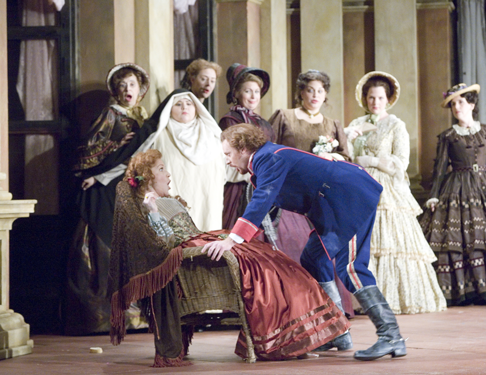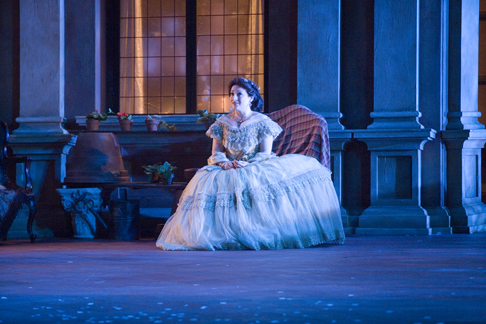07 Nov 2008
Houston brushes up its Shakespeare
In 1830, three years after the death of Beethoven and two after Schubert’s untimely demise, Berlioz, 27, dazzled the world with his phantasmagoric — perhaps drug-inspired — Symphonie fantastique.

In 1830, three years after the death of Beethoven and two after Schubert’s untimely demise, Berlioz, 27, dazzled the world with his phantasmagoric — perhaps drug-inspired — Symphonie fantastique.
With it, he opened the gates through which the monumental programmatic scores of the 19th century would soon flood the musical scene. In 1862- Berlioz wrapped up his career with the opéra comique Beatrice and Benedict, a brief and understated score of such grace and delicacy that the composer saw it as one of his loveliest and most original works — indeed, “as a caprice written with the point of a needle.”
The Houston Grand Opera, founded in 1955, kicked off its 2008 season with the work, for which Berlioz extracted the libretto from Shakespeare’s Much Ado About Nothing. In its first staging of any Berlioz work, the HGO made the Australian Opera production a delight, further underscoring the high quality that Anthony Freud in his second full year as its general director, insists upon with this company.
Australia apparently offers escape from the excesses of European Regieoper, for this production, the work of Elijah Moshinsky, recreated for Houston by Robin Tebbutt, is simple and straightforward and set realistically in the middle of Berlioz’ own 19th century. It is beautiful and enchanting. Michael Yeargan’s single outdoors set, rich in autumnal hues, is magically lighted by Howard Harrison, whose twilight is of a perfection that outdoes Nature herself, and the very full moon that rises through an arched entrance is astonishingly unhackneyed. It’s a fine touch that Moshinsky has the happy ending of the opera — a huge double wedding — caught by a period photographer. The curtain falls as his light flashes.
The performance heard on November 2, was as impressive vocally as it was visually. Joyce DiDonato and Norman Reinhardt sang the spunky title figures, two young people, proud and individually minded, fighting the fact that they are madly in love with each other. In DiDonato, now an international star, one experiences magnificent growth with each encounter; it is hardly surprising that she walks a path already strewn with awards. And Reinhardt, tall, handsome and virile of voice, is a perfect partner for her.
It is, however, Ireland’s Ailish Tynan who almost steals the show as Hero, the gentle and steadfast female of the story’s second couple. Tynan, celebrated both in Europe and the US as Susanna, Papagena and Zerlina, is a petite woman who sings with shimmering ease. And one wished that Berlioz had provided her partner Claudio, baritone Lian Bronner, with more to sing.
 Norman Reinhardt (Benedict) and Joyce DiDonato (Beatrice) in Berlioz's Beatrice and Benedict [Photo by Felix Sanchez]
Norman Reinhardt (Benedict) and Joyce DiDonato (Beatrice) in Berlioz's Beatrice and Benedict [Photo by Felix Sanchez]
Yet a third female brought splendor to the cast: Leann Sandel-Pantaleo, who was stellar as Hero’s lady-in-waiting Ursule. Hers is a voice of such melting gentleness that it is difficult to imagine that Amneris and Siegrune are among her signature roles. The duet with which Tynan and Sandel-Pantaleo concluded Act One, was a masterpiece of refined singing.
Indeed, so overwhelming were the three sopranos in the HGO cast that one wondered whether Strauss might have taken cues from Berlioz in composing Rosenkavalier. Rarely does one hear female voices so touchingly combined. The cast further documented the excellent training offered by the HGO studio, for DiDonato, Reinhardt and Bronner are all alumni of the program.
True to the conventions of opéra comique, Berlioz included a good bit of spoken dialogue in his libretto and — concerned about its delivery — instructed singers at the Baden-Baden premiere to “speak like human beings,” and that is exactly what this cast did, allowing speech and music to flow easily into each other.
 Ailish Tynan (Hero) in HGO's production of Berlioz's Beatrice and Benedict [Photo by Felix Sanchez]
Ailish Tynan (Hero) in HGO's production of Berlioz's Beatrice and Benedict [Photo by Felix Sanchez]
An unfortunate exception was veteran actor Donald Maxwell as alcoholic choirmaster Somarone, a role that is largely ad-libbed. Although a great hit with the audience, Maxwell sadly overplayed his hand, speaking further in an overblown British that conflicted sadly with the American English of the remaining cast.
Young German conductor Michael Hofstetter, now maestro of the Stuttgart Chamber Orchestra, showed his understanding of the unique and transparent reserve of this score, while bringing to the surface the melancholy undercurrent of the work. Richard Bado did his usually exemplary work with the HGO chorus.
The HGO performed the musical portion of Beatrice and Benedict in Geoffrey Dunn’s English translation, while Moshinsky, rather than translating Berlioz’ spoken text into English, went directly to Shakespeare for much of that dialogue. It was a fine touch that elevated the stature of the work. Despite its many merits Beatrice and Benedict is an uneven score, which makes the well-rounded coherence of the HGO staging even more admirable.
Wes Blomster